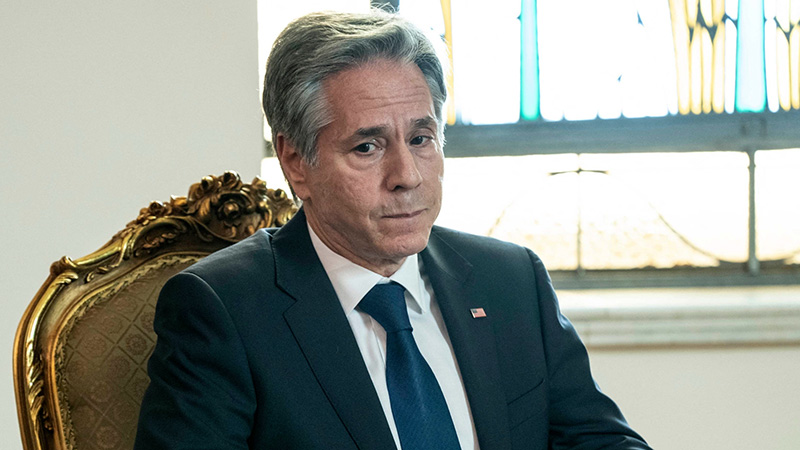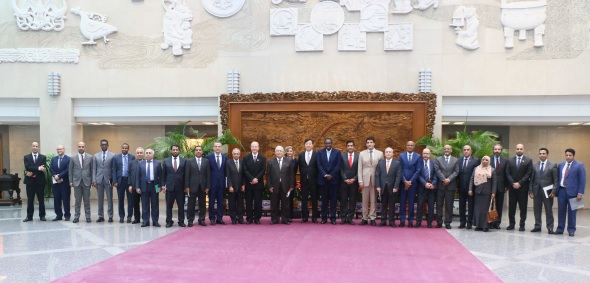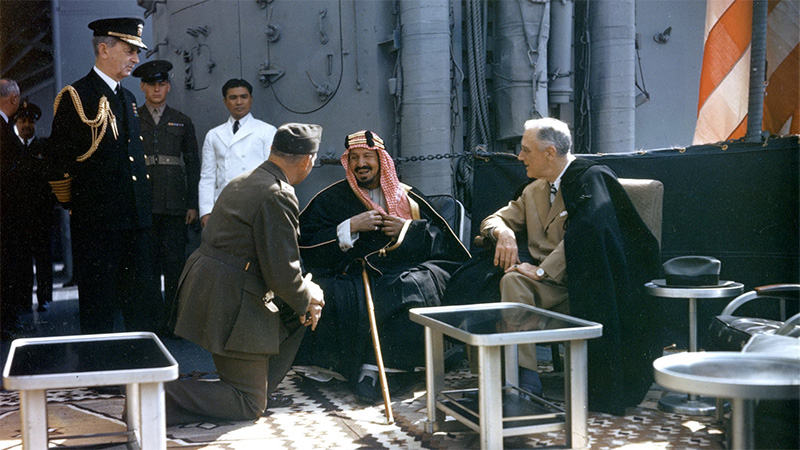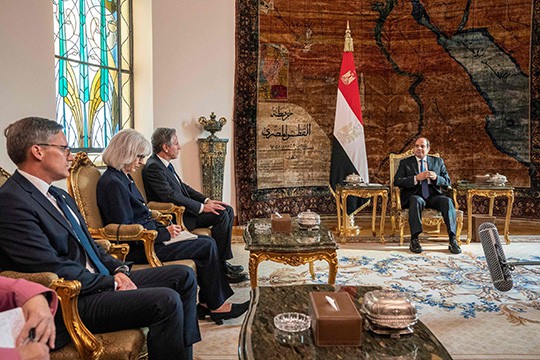Photo: Washington Post
U.S. Secretary of State Antony Blinken faced stiff resistance from the Arab world’s most powerful strongmen, trying to convince Egypt’s Abdel Fatah El-Sisi (photo) and Saudi Arabian Crown Prince Mohammed bin Salman to embrace Washington’s view of the Israel-Hamas conflict, despite deep public sympathies for the Palestinian cause in the respective countries, writes ‘The Washington Post’.
The differences of views emerged immediately on Israel’s right to wage a massive offensive in Gaza, which both Sisi and Mohammed raised concerns about.
The top U.S. diplomat is hopscotching the Middle East with the goal of convincing Arab partners to condemn Hamas’s horrific assault in Israel and refrain from stoking domestic unrest in response to Israel’s devastating bombing campaign in Gaza. The violence has resulted in the death of more than 1,300 Israelis and more than 2,600 Palestinians.
In Riyadh, the Saudi ruler kept Blinken waiting several hours for a meeting presumed to happen in the evening but which the crown prince only showed up for the next morning.
Once the meeting began, Mohammed “stressed” the need to stop the military operations “that claimed the lives of innocent people” — a reference to Israel’s offensive — and lift the “siege of Gaza” that has left the Palestinian territory without water, electricity or fuel, according to the Saudi summary of the meeting.
The crown prince also called for a halt in the “current escalation” in the conflict, a direct contradiction of U.S. policy, which has backed Israel to pursue its maximalist goal of eradicating Hamas.
Saudi Arabia, the birthplace of Islam and home to its two holiest sites, is an influential voice in shaping Arab perceptions of the conflict. While Riyadh prizes its role as a defender of Palestinians, it views Hamas as a spoiler to greater regional integration, including the crown prince’s flirtations with normalizing relations with Israel.
But efforts to convince Riyadh to condemn Hamas have failed thus far, and the Saudi foreign ministry has denounced Israel’s extensive bombing campaign in Gaza, calling it an assault on “defenseless civilians.” U.S. engagement with Egypt has faced even more hurdles.
U.S. officials announced that they had reached an agreement with Cairo for a temporary opening at the Rafah border between Gaza and Egypt for U.S. citizens seeking to flee the violence and Israeli bombardment. The announcement resulted in scores of the estimated 500- to 600 Palestinian Americans in Gaza rushing to the border, but none have been able to cross into Egypt amid contradictory remarks between U.S. and Egyptian officials about why the border won’t reopen.

The Rafah border crossing — the only egress that Israel does not control — has also remained closed to critical supplies of food, water, fuel and medicine that aid groups and friendly nations, with Egypt’s coordination, are trying to send into Gaza. Israeli airstrikes damaged the crossing last week, and Israel was unwilling to commit to not striking aid vehicles that enter Gaza, a diplomatic official told The Post Saturday, speaking on the condition of anonymity because the official was not authorized to discuss sensitive negotiations.
During Blinken’s meeting at the presidential palace in Cairo on Sunday, Sisi said Israel’s assaults have exceeded “the right of self-defense,” and turned into “collective punishment.”
The Egyptian president also commented on Blinken’s recent remarks in Israel in which the U.S. diplomat invoked his own Jewish heritage in explaining his understanding of Jewish oppression.
“You said that you are a Jewish person and I am an Egyptian person who grew up next to Jews in Egypt,” Sisi said. “They have never been subjected to any form of oppression or targeting and it has never happened in our region that Jews were targeted in recent or old history.”
 Photo: Washington Post
Photo: Washington Post
While Sisi denounced Hamas’s assault on Israelis, he blamed Israel for driving Palestinians to desperation given the lack of progress toward a two-state solution. After Sisi met with his national security council earlier Sunday, his office put out a statement calling for an international summit “to study the future of the Palestinian cause.” Blinken told reporters he supported the idea but “we have to get through this crisis first.”
But Egyptian officials have been clear that relocating Palestinians to Egypt en masse is not an option, warning that doing so could spell the end of the Palestinian dream of statehood.
 China’s Special Envoy on Middle East Zhai Jun met the envoys of Arab states in Beijing at the latter’s request for a group meeting to discuss the grave situation in Gaza, Beijing, October 13, 2023
China’s Special Envoy on Middle East Zhai Jun met the envoys of Arab states in Beijing at the latter’s request for a group meeting to discuss the grave situation in Gaza, Beijing, October 13, 2023
The Ottoman Empire disintegrated as a result of the Arab Revolt. Israel too will have to vacate its occupied territories and make space for a state of Palestine, which of course, will be a crushing defeat for the US and marks the end of its global dominance, notes M.K. Bhadrakumar, Indian Ambassador and prominent international observer.
The torrential flow of events through the past week is breathtaking, starting with a phone call made by Iran’s President Sayyid Ebrahim Raisi to the Saudi Crown Prince Mohammed bin Salman to discuss a common strategy toward the situation following the devastating attack by the Islamic Resistance Movement, Hamas, against Israel on October 7.
Amir-Abdollahian embarked on a regional tour to Iraq, Lebanon, Syria and Qatar through Saturday to coordinate with the various resistance groups. Notably, he met Hezbollah leader Hassan Nasrallah in Beirut and Hamas leader Ismail Haniyeh in Doha. Amir-Abdollahian told the media that unless Israel stopped its barbaric air strikes on Gaza, an escalation by the Resistance is inevitable and Israel could suffer a “huge earthquake,” as Hezbollah is in a state of readiness to intervene.
Tehran has delivered a strong message to Tel Aviv via the UN that it will have to intervene if the Israeli aggression on Gaza persists. Simply put, Tehran will not be deterred by the deployment of 2 US aircraft carriers and several warships and fighter jets off the shores of Israel.
An extraordinary event took place in the Chinese foreign ministry when the Arab envoys in Beijing sought a group meeting with Special Envoy Zhai to underscore their collective stance that a “very severe” humanitarian crisis has emerged following Israel’s attack on Gaza and “the international community has the responsibility to take immediate actions to ease the tension, promote the resumption of talks for peace, and safeguard the Palestinian people’s lawful national rights.” The Arab ambassadors thanked China “for upholding a just position on the Palestinian question… and expressed the hope that China will continue to play a positive and constructive role.” Zhai voiced full understanding that the “top priority is to keep calm and exercise restraint, protect civilians, and provide necessary conditions for relieving the humanitarian crisis.”
After this extraordinary meeting, the Chinese Foreign Ministry posted on its website at midnight a full-bodied statement by Member of the Political Bureau of the CPC Central Committee and Foreign Minister Wang Yi titled China Stands on the Side of Peace and Human Conscience on the Question of Palestine. This reportedly prompted a call by the Saudi Foreign Minister Prince Faisal bin Farhan to Wang Yi.
Going forward, the Arab-Iran-China axis will raise the plight of Gaza in the UN Security Council unless Israel retracted. Russia has proposed a draft resolution and is insisting on a voting. If the US vetoes the resolution, the UN GA may step in to adopt it.
Meanwhile, the US project to resuscitate the Abraham Accords loses traction and the plot to undermine the China-brokered Saudi-Iranian rapprochement faces sudden death.
As regards the power dynamic in West Asia, these trends can only work to the advantage of Russia and China, especially if the BRICS were to take a lead role at some point to navigate a Middle East peace process that is no longer the monopoly of the US. This is payback time for Russia.
The era of petrodollar is ending — and along with that, the US’ global hegemony. The emergent trends, therefore, go a long way to strengthen multipolarity in the world order, M.K. Bhadrakumar stresses.
 King Abdul Aziz Ibn Saud of Saudi Arabia (center) meeting with President Franklin D. Roosevelt aboard the USS Quincy on February 14, 1945.
King Abdul Aziz Ibn Saud of Saudi Arabia (center) meeting with President Franklin D. Roosevelt aboard the USS Quincy on February 14, 1945.
Photo: National archives/Getty images
When USA President Franklin D. Roosevelt met with King Abdul Aziz Ibn Saud of Saudi Arabia on February 14, 1945 aboard a U.S. Navy destroyer in the Suez Canal, it was the first time a U.S. president had ever met with a Saudi Arabian king, and the encounter laid a foundation for U.S.-Saudi relations that would continue for generations — and ensure U.S. access to Saudi oil reserves, writes Lesley Kennedy, a features writer and editor from Denver.
The principal reason for the meeting, which lasted several hours, according to Scott Montgomery, author and affiliate faculty member in the Jackson School of International Studies at the University of Washington, had to do with the prospect of a Jewish homeland in the Middle East, with Roosevelt trying to persuade the king to accept 10,000 Jews in Palestine.
Montgomery says Abdul Aziz was internationally considered a key Arab leader, heroic warrior and legendary figure. Their meeting was secret, he says, because the war was still going on and FDR had pledged to England’s Winston Churchill that the United States would not intervene in territory controlled by the British. Just a few weeks before, Stalin’s armies had liberated Auschwitz, exposing its horrors to the world.
It turns out, the two leaders hit it off so well that Roosevelt, who would die just eight weeks after the meeting, gifted the king with one of his wheelchairs (as well as a DC-3 passenger plane). The king, in turn, gave the president gifts, including a diamond-encrusted dagger, perfumes, pearl jewelry, belts of woven gold thread and embroidered harem costumes, Montgomery says.
“Roosevelt seems to have been in top form and the king was warm in return,” he adds. “He famously said that he and FDR were ‘twins’ of a sort—roughly the same age, both heads of state with grave responsibilities, both farmers at heart and both stricken with physical infirmities, as FDR was in a wheelchair and the king walked with much pain and difficulty due to wounds in his legs from many battles when he was younger.”
Despite the personal good will, however, Roosevelt failed in persuading Abdul Aziz that Palestine should be a Jewish homeland, according to Montgomery.
“Based on accounts by Roosevelt and his translator, FDR was persistent in returning to this subject, but to no avail,” he says. “The king’s position was firm: The Germans should be made to give up territory for this purpose. They were the aggressors and had committed the crimes and oppressions against the Jews.”
read more in our Telegram-channel https://t.me/The_International_Affairs

 12:13 17.10.2023 •
12:13 17.10.2023 •























